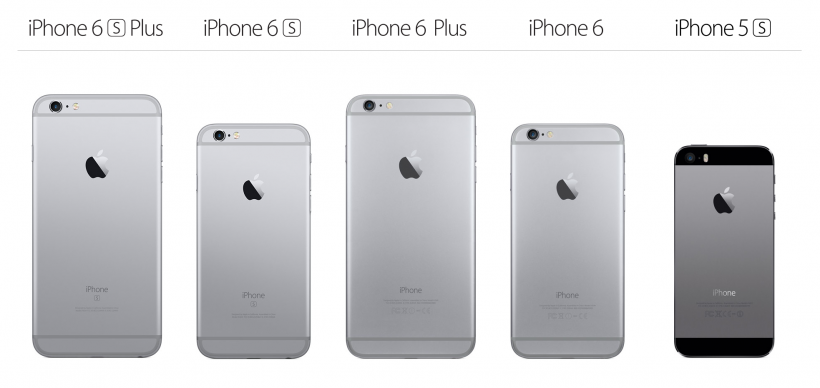Submitted by Rex Chamberlain on
Making the decision of what phone you want to be stuck with for the next year or two can be daunting. For loyal Apple users, even the task of choosing a new iPhone has become more difficult because of Apple's new trend of offering different models. Currently, Apple offers the most recent iPhone 6s and 6s Plus, the previous year's iPhone 6 and 6 Plus and the iPhone 5s for those who refuse to let go of the smaller form factor.
If you are struggling with the decision, you're in the right place. Let's walk through the factors you need to consider before spending your hard earned cash on a new iPhone.
Screen Size
The number one thing to consider is the screen size. The iPhone 6s and 6s Plus maintain the same 4.7-inch and 5.5-inch display size introduced in the 6 and 6 Plus.
If portability is your primary concern and you want to be able to use your phone one handed, you can immediately count out the massive 6s Plus.However, the smaller iPhone 6s is still too big for many people to use one handed. If that's you and one handed use is a necessity, I would recommend avoiding the outdated iPhone 5s because Apple is expected to release a new 4-inch iPhone in the coming months.
Newest iPhone FAQs
The 6s Plus is a great option for watching videos, playing games, reading and so on. If you can manage the size, there are some great payoffs for that extra screen real estate.
If you are considering the iPhone 6s Plus but are worried about the durability after the bendgate bonanza regarding the iPhone 6 Plus, you can rest easy. Apple has addressed the issue by upgrading the body of both new iPhones to 7000-series aluminium, which is much more resilient.
Battery
Beyond the screen size, battery life is the next big thing to consider. Regardless of what iPhone you purchase, it's not worth much when it's dead.
The iPhone 6s features a 1715 mAh battery while the 6s Plus packs a significantly larger 2750 mAh battery. The 6s has trouble lasting a full day under heavy usage. So, if you consider yourself a power user, you may want to lean towards the 6s Plus. The battery in the 6s Plus is by far the better bet, especially if you don't habitually charge your phone at night.
Cameras
Camera quality is usually near the top of the list for people considering an iPhone. It's no surprise that the 12-megapixel cameras in both new iPhones are the best Apple has ever released, but there are some key differences between the two.
Most notably, the 6s Plus includes Optical Image Stabilization (OIS). This is similar to the iPhone 6 Plus, but Apple added OIS to video shooting in the 6s Plus. If you shoot a lot of video while running around chasing kids or pets, you will be amazed at how smooth videos from the 6s Plus turn out. Overall, the cameras in both the 6s and 6s Plus are very similar, but again you get a few extra features with the larger phone.
Price
There are some extra features packed into the iPhone 6s Plus, but you're going to pay an extra $100 for them. Both new iPhones are available in 16 GB, 64 GB and 128 GB models but the 6s Plus costs $100 more than the corresponding 6s model.
The iPhone 6 or 6 Plus are older models and lack some of the features included in the 6s and 6s Plus, but if you don't care about having the most cutting edge features you can probably score an iPhone 6 or 6 Plus for a heavy discount.
Conclusion
Obviously, the iPhone you choose comes down to personal preference. The smaller iPhone 6s and upcoming 4-inch iPhone are probably more practical for most people. It's easier to carry, hold and lug around a smaller phone while the iPhone 6s Plus is much more cumbersome. However, the larger iPhone does have better battery life and Optical Image Stabilization for better photos. While those features are nice, they're not as important as how much you enjoy holding and using your iPhone.
If you can handle the size, iPhone 6s Plus is highly recommended because of the extra perks that come with it. Whatever you choose, it's always best to go to a store and spend a little time holding each one before you pull the trigger.
